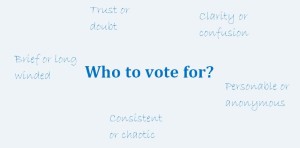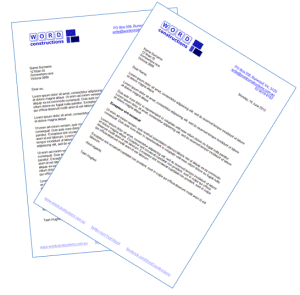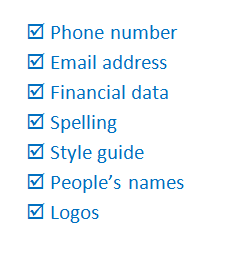I hope you find my writing and business tips and observations useful. My business and blog are dedicated to helping businesses communicate clearly and reach their potential.
Read, subscribe to my newsletter, enjoy!Tash
also comes after
Reading and editing a document recently, I came across the following text as the first paragraph in a new section of the document:
We will also deal with your request for access…
So today’s Monday Meaning is for one word instead of a pair of words.
Also [adverb]: as well as, too, in addition, besides
Please bring pen and paper. Also bring a snack.
Getting back to the example above, it is wrong because ‘we’ can’t ‘also’ deal with a request if ‘we’ aren’t already dealing with something for you.
Words like also and too must follow, or come after, something rather than being the first item in a list.
Facebook ads – short but important
Proof reading is important – even for short and (relatively) simple things like a Facebook ad.
A Facebook ad that needs proof reading
Unfortunately my screenshot didn’t work (and the ad hasn’t shown again since!) but I saw an ad this morning that seriously needed some help…
The heading of the ad was “New year. New hom.”
For a major company involved in real estate sales, you’d think home is an important word to get right.
I’d also have expected a company of that size to have a process of checking and approving ads before they go live – a one-person business is often at bigger risk of such errors because it is harder to correct your own writing.
The body of the ad included “but hurry – offer ends 28 February!”
Perhaps they meant hurry into your time machine?
That isn’t necessarily a proof reading error (unless they actually got the date wrong!) as it may be an incorrect setting on when the ad is to be run. Either way, attention to detail can have a big impact!
Proof reading matters…
We all do it – we write something and assume it is written exactly as we meant it to be.
But between typing mistakes (typos), thinking faster than we can type and actual spelling/grammatical errors, it is easy to have text that is not exactly what we wanted.
So we need to check our writing for errors. ALL our writing, whether short or long, whether technical, legally required or marketing, whether online or offline. It’s that simple!
And the key proof reading rules are to get someone else to check it and leave some time between the writing and proof reading.
Oh, and don’t rely on spell check to find all your errors, either. For example, in this post I typed ‘won’ instead of ‘own’ and a spell check would have accepted that as fine.[Tweet “Leave time between writing and proof reading, and don’t rely on spell check…”]

![]()

Keep it simple…

Simple but clear – this image tells a story without trying to impress or be more than it is. This makes for good communication.
The purpose of the written word is to communicate.
Sometimes that does include some complexity but I strongly believe it should be kept as simple as possible. Why make people work hard at understanding and increase the risk of misunderstanding?
I recently came across the following:
Email us to inform us about updates regarding your personal information.
And it struck me how some people try to impress and seem ‘professional’ by using complexity when it really isn’t needed. In the example above, why not just write:
Email us with any changes to your contact details.
Consistent pronouns
Mixing pronouns is a little like mixing drinks – both can lead to a fuzzy head!
Pronouns
Just as a reminder, a pronoun is a word that is used in place of a noun. So ‘he’ replace’ John’ and ‘her’ replaces ‘Suzie’s’, and so on.
Pronouns are useful for
- making writing shorter and clearer (it takes less to write ‘they’ than ‘John, Mary, Chuan and Connor’ for example)
- avoiding repetition of the noun (compare ‘Joe rode Joe’s bike until Joe felt too tired’ and ‘Joe rode his bike until he felt too tired’)
- provide emphasis towards one noun (such as ‘The teacher herself missed the error in that question’). Mind you, this is a somewhat old fashioned way to write and I don’t recommend its use in business writing.
There are different pronouns depending on gender and whether the noun is plural or singular.
Use pronouns consistently
When using pronouns, make sure you maintain the same or matching pronoun throughout a sentence and paragraph.
I recently read
For more details about {our product}, contact us on 1234 5678 or visit their website.
The writer swaps from being part of the company (by using ‘us’) to being external to the company (by using ‘their’). Which is jarring and somewhat confusing.
If in doubt about which pronoun to use, swap in the correct noun and make sure the sentence makes sense.
Or make a conscious choice about the type of pronoun (such as if your business uses me or we, us or it), put it into your style guide and stick to it.
Do you have any trouble with pronouns? Have you ever checked the pronoun use on your website is consistent?
Communications can win or lose votes
I don’t watch politics for fun. In fact, I don’t like politics very much at all and I often find their behaviour childish. Childish in a way I wouldn’t tolerate from any actual children…
Yet I am going to write a blog post inspired by a politician and Saturday’s election. It is mainly about their communications so no need to hide from another political statement!
Checking my options
Earlier this week, I went to a number of websites to find out more about the smaller parties. Namely because I can’t bring myself to vote for either major party this year – blocking refugees asking for help is simply wrong.
On each site, I looked at their policy ideas and details on their candidate in my area.
Learning from their websites
Based on reviewing a few sites covering the same basic idea (ie what the political party stands for and why we should vote for them), here are some useful website tips for us all:
- Summaries and simplicity are good.
A short summary of each policy area with a link to greater details made one site much easier to read and quickly gave me an overview of the party. The lists of actual policies were also brief and to the point. It was therefore easy to decide whether or not I liked them.
Other sites waffled on or gave me a long list of policies to choose from which was more intimidating than a single-page summary. - Dead links are frustrating and reduce your credibility.
One site had my local candidate listed but every link on his name took me to an error page. Given I found the rest of the site a bit vague, I really wanted an impression of him to make a decision. Instead, I was frustrated and didn’t feel the party was very professional or reliable. - Explain who you are fast.
One site (and I spent very little time on their site once I started reading their offensive nonsense, so maybe there’s a reason for their web design!) had a huge banner and blog posts on the home page. It gave me no idea of who they were (not even that they are in fact a political party) which is what I wanted to know – their latest news is in the realm of politics I don’t care about!
A clear tagline, an introduction or useful imagery can give information to site visitors quickly and makes life easier for people. - Show information, or don’t – changing is annoying.
I clicked through to an inner page which was basically a list of questions. Initially, I saw questions and answers but as I was part way through reading the start of one answer, it disappeared to show me a list of questions. Obviously, their software is set to narrow the content to just the questions but the loading time was so slow it showed answers first. Very frustrating to deal with as a site visitor.
Have you checked how your clever settings actually work for site visitors? Often a simple solution works consistently so is better than a fancier option.
Learning from the candidates
Remember how I couldn’t find information about my local candidate above? I found a media release about him and some others in his party which my local candidate had replied to in the comments.
There is both good and bad to be learned from those comments…
His first comment was long. Maybe a third of a page without paragraph breaks long (lack of structure may be due to the software, which is on the party not him, so I’ll give him a pass there!) It started with a lot of impressive words strung into a sentence or two that made absolutely no sense. Instantly I had no faith in him and no desire to vote for him.
The lesson – make sure anyone representing your business online can write reasonably well or do it for them. A genuine message is better than trying to impress readers.
However, I will give him credit for answering multiple people’s questions to the media release. Responding to comments and questions showed enthusiasm and passion, and listening to people is a precious commodity when it comes to politicians.
Yes, some of those answers were long winded and were nice ways of fobbing off hard questions but he was trying.
The lesson – respond to people online to build rapport, show your personality and gain another opportunity to explain your purpose or skills. Remember, people may see this rather than your carefully crafted profile – especially if a link is faulty!
What have you learned from this election?
Have you come across examples where a politician or political party has communicated well or poorly?
Maybe some of the above examples have inspired you to check your own website with a different perspective. If so, I’d love to hear about it in the comments below…
While I am not going to vote for a party just because they did the best job with their website, being able to easily understand the party does influence my choices.
Just like as a business owner or consumer I am not going to buy something just because you have the prettiest website, but I am more likely to trust you (and thus give you my money!) if your site is professional, simple to use and inoffensive.
But based purely on my descriptions of their websites, who would you vote for from the above examples?
Personally the first site I mentioned would get my vote – their summaries and easy-to-navigate site made it easy.
Without context, messages get lost
In an article about Australian Standards on what I thought a national-focus site, the following section stood out…
The retrofitting of automatic sprinkler systems became a mandatory requirement for existing aged care facilities in January 2013. Similar requirements also exist in Victoria and Queensland.
So two states have similar laws to the national laws? Why are the national laws not, well, national?
Or is the author just assuming everyone knows he is writing about a particular state because it is so important and somehow obvious?
Or was something edited out that made it clearer in the draft?
Fire safety is important – but so is clarity so people understand your message.
Clarify your context…
When proof reading and editing, always make sure you read your writing from start to finish to check the correct context is in place.
A better way to write the above sentence (and I’m guessing which state is the assumed one!) would be…
In January 2013, the retrofitting of automatic sprinkler systems became a mandatory requirement for existing aged care facilities in Tasmania, Victoria and Queensland.
I think it would also be nice to add another sentence along the lines of “The other states are reviewing their laws” or “Currently the other states have this as a voluntary measure”. I prefer to get the whole picture, but that could just be me!
If you want to avoid similar errors, let me know – I offer proof-reading and editing services as well as writing 🙂
You can write great client letters
I wrote about an officious bank letter that resulted in me closing my account.
There was more to that letter for teaching about good letter construction, so here are some tips for you…
- the letter was on two pages
This was unnecessary, unavoidable and can really annoy readers. It looks longer so is off-putting and is just a waste of effort. With better writing it could easily have been shorter and their letter format included a lot of wasted space. - one line of the letter contained only ‘if:’
It is best practice to avoid a single word on a line (designers call this as leaving orphans and widows), especially such a short word - every number in the letter was written as ‘three (3) years’
Frankly, people can either read or they can’t, so ‘three’ or ‘3’ is sufficient – adding both is unnecessary and looks wrong - first sentence is 3.5 lines long…
It was simply too long, both visually and for comprehension. When in doubt, go for shorter. - lack of clarity throughout the letter
The letter went from the consequences to the definition to the impact for me so it was hard to follow – I had no reason to care about the consequences until I knew the relevance and definition!
Remember to explain the relevance of any information first. They could also have improved it a lot by using a sub-heading for the full definition of inactive account – I could skim that section or read it for details without feeling confused. - a missed personalisation opportunity
The letter stated ‘your account referred to above’ – it’s not hard to mail merge (and they were already merging in my name and address!) so why not use ‘your xyz account’ which is more personal and easier to read - an entire section was irrelevant to me
why include a long paragraph, including two bullet points, on offset deposit accounts when I don’t have one? Setting up a conditional rule on this paragraph would be easy to do so it only goes to relevant clients. Or at least have it under a sub-heading so it doesn’t clutter the main letter and distract from the meaning
A drop of honey in your writing works
Some years ago, I opened a saving account with a higher interest rate for the proverbial rainy day. I haven’t used that account much for some time but received a letter from that bank that I wanted to share.
Threatening feel
With opening words ‘Inactive account’, the letter launched with a long paragraph about money in inactive accounts being transferred to ASIC. The paragraph ended with a ‘by the way, the Government recently changed the inactivity period to 3 years from 7 years’ message.
It went on to define in active accounts.
Followed by a sub-heading “Your inactive xyz account”.
At this point I was angry because I hadn’t been told about the change in law nor that my money would be transferred to ASIC so “how dare they do that”.
The letter then mentioned I could prevent the transfer by using my account before the end of January.
Why not tell me that first as it is actually the most important thing for me to know?
And encouraging me to make another deposit is surely in the bank’s best interests, too?
Why let me get angry and annoyed rather than show me they are trying to help my keep my money?
The harsh letter made me uncomfortable, and as I only had a small amount of money left in there, my response was to withdraw all my money and close the account myself.
This is obviously a necessary letter for banks, but I think they are missing a relationship building and marketing opportunity to write it in such harsh terms.
Even if most people still closed their accounts, they would do so without negative feelings towards that bank…
It could have been personable and helpful
In contrast I recently wrote a letter for a client along similar lines.
That letter effectively read:
You haven’t made a contribution for some time so your account is about to be classed as inactive.
If you make a contribution by xx, your account will be reactivated. Otherwise, your account will have to be closed.
Another option would have been to write:
Did you know that any account without transactions for 3 years are classed as inactive? And that we have to transfer money in inactive accounts to ASIC?
To avoid this for your account, please make a deposit or withdrawal by xx.
Or they could have focussed on the change in law as important news:
Did you know it’s been nearly three years since you used your account?
The Commonwealth Government recently changes the law so accounts are classed as inactive after 3 years rather than seven. That means your account could soon be classed as inactive.
By law, we must transfer money from inactive accounts to ASIC.
Of course, you can reactivate your account by making a deposit or withdrawal before xxx.
Which version would you prefer to receive?
* Images courtesy of kozzi28% young drivers killed
In 2007, 28% of Victorian drivers aged 18 – 25 were killed.
What a terrible statistic.
It’s also pretty surprising – at 30 June 2006, 902,796 Victorians were aged 18 – 24. 28% of that is 252,782.
The Victorian road toll in 2007 was 333.
So I looked at a Victorian Government website and found this sentence:
While 18 to 25 year olds represent around 14% of licenced drivers, they accounted for approximately 28% of all drivers killed on Victoria’s roads.
28% of the state road toll was 93. Awful to lose that many young people, but significantly better than losing 252,782 of them.
Checking meaning is important
That first sentence is perfectly acceptable in terms of grammar and spelling, and it makes sense when you read it.
But the authors and editors of that text book (yes, I found that sentence in my daughter’s current VCE text book on health) didn’t check that the correct meaning was being communicated.
There is a huge difference in meaning between 28% of young drivers were killed and 28% of killed drivers were young.
Somewhat detracts from the credibility of that text book, doesn’t it?
Do you think I should read the entire book and check every fact they state, or assume it was a one-off?
You’d think the big guys would get it right…
Is it just me, or do you have more tolerance of a small business making mistakes than a big business?
That is, for mistakes like spelling errors, dead links on their website, out of date information and lack of clarity in a message.
I think if you have the budget for huge campaigns, you have the budget to get a writer or editor to help you avoid stupid mistakes. A sole trader on the other hand often has less money to spend and more hats to wear so mistakes are a little more excusable.
Budget for the details
I was asked by a major entity to complete a survey that they intend to use to produce some data that can impact on the digital media and brands.
It was longer than I expected but more than that, it was very disappointing from a group that is producing such a report.
Having a poor survey through lack of attention to detail reduces their credibility – if they can’t get the questions right, is their analysis going to be any good?
Compared to the time and money they have put into preparing and promoting this survey, and then turning the results into a report, it would have cost little to have had it reviewed by a writer or editor to ensure it would work. It’s like spending a million dollars to build your dream house but not checking the architect remembered to add a front door.
International survey
Some of the issues I came across in this particular survey were:
- I was invited twice (ie via two different .com.au email addresses) to complete this survey. Yet there was a question ‘Please enter your five digit zip code’ – my four digit postcode wasn’t accepted. So are they so ignorant to not realise we don’t all have a US zip code (the error messages actually stated “You must enter a valid US zip code”) or was this survey only meant for US residents?
Tip: if preparing any sort of online form, make it usable for all aspects of your audience – and make it clear at the start if some groups can’t participate - There were too many assumptions within the questions, but I had to answer them anyway so they are getting meaningless results from the survey. For example, “which of the following do you generate money from?” listed about six possible answers – I don’t earn money from any of them but there wasn’t a ‘none of the above’ type answer.
I did get some satisfaction in a couple of those questions if they at least gave an ‘other’ option as I wrote the real answer in that field!
Tip: always have an answer for everyone in a survey – if people can’t answer, they can skew your results with dummy answers and it frustrates them - One question asked ‘what is your key source for finding companies that don’t meet your requirements?’ followed by a series of criteria that you could use to filter out a company and a couple of other points. In other words, it made absolutely no sense and I couldn’t answer it – well I used the ‘other’ field to say it made no sense so I couldn’t choose from their list!
Tip: always do a final read of materials to ensure everything makes sense. Edits along the way can change things so read it in full to be sure – and preferably get fresh eyes to view it, too.

Poor data can’t result in a good report, whichever way you add it
One better written question they included asked where I got inspiration for my blog posts. I could only select one answer, which is limiting as I find inspiration in many places. However, I again used the ‘other’ option and wrote I am inspired by poor communications efforts I see – such as surveys like this with poor questions! You have to find fun where you can, I say!
So not a great survey (and I will struggle to trust their results) but it did inspire a blog post and gave me some amusement using their ‘other’ fields!












Recent Comments